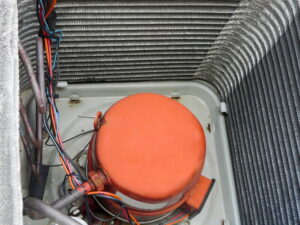
All the components of your home’s central air conditioning system have important jobs. But one component has a special elevated status: the compressor. This is the engine of the entire AC, since it’s where energy is applied to the refrigerant to put it under pressure and then start the process of circulating through the system and moving heat from inside the home to outside.
The compressor uses the most electrical power of any part of the air conditioner (from 2,900 to 4,100 watts per hour) and it’s also expensive to replace if it burns out. The cost to replace a failed compressor is often costly enough that if the part is no longer under warranty it is more cost-effective to replace the entire air conditioning system.
We want to help you avoid a major compressor failure so you won’t have to face a late summer air conditioning replacement in North Little Rock, AR or elsewhere in the Conway area. You can’t stop all compressor failures, but if you detect early warnings of a compressor that’s struggling or in danger of burning out, you can often get our technicians to rescue the system so it will keep working efficiently for several more years. Below are some signs of an at-risk compressor to watch for.
The condenser cabinet is visibly vibrating
When the compressor is running, you’ll feel mechanical vibrations when you place your hand on the condenser cabinet. But you shouldn’t be able to see the cabinet vibrate. This indicates the compressor is overworking or coming loose. The problem might also be with the exhaust fan, which is also something you want repaired ASAP.
The compressor is making shrieking or grinding noises
These sounds are probably coming from the compressor motor as it starts to fail. If the motor overheats and burns out (fusing the wires to the housing), it means the compressor is shot and must be replaced. If you catch this noise early enough, technicians may be able to repair the compressor’s motors by lubricating moving parts or replacing motor bearings.
Changes in indoor humidity
When the compressor begins to lag with circulating enough refrigerant through the AC’s coils, one of the early effects is that humidity indoors will increase. The cold refrigerant in the evaporator coil draws out some moisture from the air during the cooling process, so a failing compressor will allow more humidity to remain in the air.
The compressor is hard starting
This is when the compressor must draw on more power to overcome resistance during the start-up cycle. You’ll notice the AC has problems getting started with each cooling cycle. Technicians can help overcome this and protect the compressor by installing a hard start kit that provides an extra electrical “kick” to get the compressor going.
Frequently tripping circuit breaker
An overheating compressor can cause the AC’s electric circuit to overload, and its circuit breaker will trip. When you have to repeatedly reset the circuit breaker when the AC turns on, please call for technicians to see what’s wrong—otherwise you may soon have a dead air conditioner on your hands.
Dewees HVAC proudly serves the Conway area, and we’re ready to help with your AC needs. Call us—we’re here to keep you comfortable.
